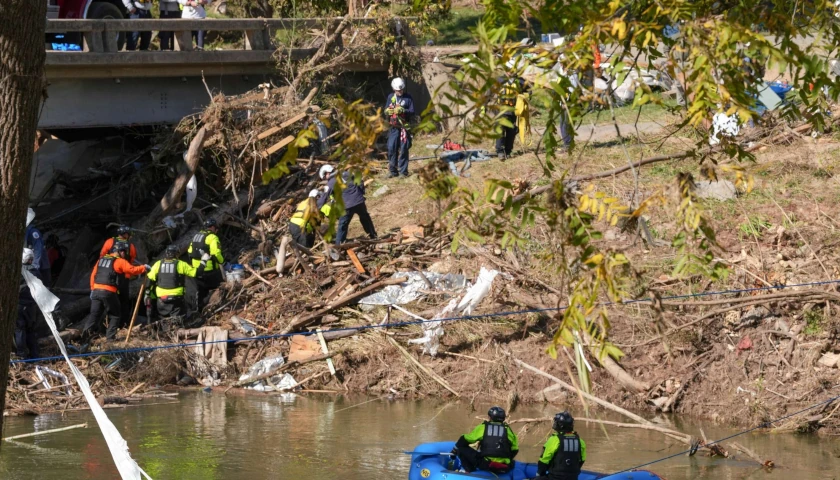by Harold Hutchison
Republican Iowa Sen. Joni Ernst unveiled a scathing report on the effects of telework on the federal government Thursday, citing multiple instances of abuse and failures stemming from the widespread use of the practice.
President-elect Donald Trump named Tesla CEO Elon Musk and former Republican presidential candidate Vivek Ramaswamy as co-chairs of DOGE on Nov. 12. Ernst’s 60-page report covered findings from Ernst’s investigations into telework since she sent an August 2023 letter to 24 government agencies seeking a review of the issues involved with telecommuting and was released at the meeting that Musk and Ramaswamy attended.
“If federal employees can’t be found at their desks, exactly where are they?” the report asked earlier, before noting the effects of the absences from the office.
Ernst called out multiple high-ranking Biden administration officials for being away from the office, including Secretary of Defense Lloyd Austin and Secretary of Transportation Pete Buttigieg and revealed performance issues in agencies like the Department of Agriculture and the Department of Veteran’s Affairs.
 “Federal employees are on the beach and in bubble baths but not in office buildings,” Ernst told the Daily Caller News Foundation. “Even members of President Biden’s cabinet claimed to be on the clock while being out of office and unreachable. Unlike Biden’s bureaucrats, I am about to be very busy making Washington work for taxpayers.”
“Federal employees are on the beach and in bubble baths but not in office buildings,” Ernst told the Daily Caller News Foundation. “Even members of President Biden’s cabinet claimed to be on the clock while being out of office and unreachable. Unlike Biden’s bureaucrats, I am about to be very busy making Washington work for taxpayers.”
Ernst previously raised concerns about the vacancy rate at federal office buildings, noting that the Transportation Department has used less than 15% of its office space in its Washington, D.C., headquarters complex. In the report, Ernst described how the shift to telework delayed the response to a complaint about conditions at a baby formula factory that led to a recall after the contaminated formula killed nine children.
“The whistleblower complaint detailing safety concerns at an infant formula plant was delivered to the FDA in October 2021,” the report says. But ‘mailroom staffing issues due to COVID-19,’ namely employees working remotely, ‘prevented the hardcopies from reaching FDA senior leaders’ until February, when the plant was then shut down.”
“A backlog of food facility inspections caused by COVID-19 era policies is currently being reviewed by the Department of Health and Human Services (HHS) Office of Inspector General (OIG). The findings are expected to be released in 2025,” the report adds. “Thousands of pharmaceutical plants that manufacture antibiotics, cancer therapies, and other medicines have also not been inspected since prior to the pandemic. The Associated Press reports the FDA ‘began using video and other online tools to evaluate plants remotely during COVID-19, although those aren’t equivalent to physical inspections.’ And even with remote inspections, almost 40 percent fewer inspections are being conducted now than before the pandemic.”
The Ernst report described issues telework created involving locality pay, an adjustment to the basic pay of civilian employees in the federal government intended to make sure that federal employees have comparable compensation to private-sector counterparts in a given area of the country. The report noted that as many as 68% of employees were receiving incorrect locality pay.
“A number of U.S. Agency for International Development (USAID) employees have also been busted fraudulently collecting Washington, D.C. locality pay while living elsewhere,” the report states. “One senior USAID employee lived in Florida for the duration of her employment but used an office supply store in Virginia for work-related correspondences to deceptively collect D.C. locality pay. Despite being required to report to the USAID office in Washington, D.C. twice every pay period, she was permitted to violate the telework agreement by her supervisor.”
The report also detailed how an employee of the Department of Housing and Urban Development was arrested for driving under the influence while supposedly being on the clock and how a Social Security Administration employee was launching a home-inspection business on government time.
The report also noted issues with largely vacant office buildings stemming from the widespread authorization for telework that extended to as many as 90% of employees, depending on the agency. The report said that in addition to wasting taxpayer dollars, the vacant building created an unsafe environment.
“The [Public Buildings Reform Board] adds, ‘In addition to high costs, other problems with low utilization rates include environmental and health impacts,” the report states. “The per person carbon emissions from heating and cooling nearly empty buildings, not to mention energy costs, are indefensible. Severely underutilized buildings can also pose health risks to their occupants as GSA recently discovered with Legionella outbreaks in many of its buildings when water stagnated in their plumbing systems from underutilization.’”
“Legionella is a bacterium that can cause Legionnaires’ Disease, a severe form of pneumonia with a 33 percent mortality rate in pediatric cases, and up to 80 percent mortality rate in at-risk adults,” the report continues. “While most healthy people exposed to the bacteria don’t get sick, the Centers for Disease Control and Prevention (CDC) notes, ‘there’s no known safe level or type of Legionella.’”
Ernst wrote the Environmental Protection Agency (EPA), urging the agency to take emergency action in an August 28 letter sent to EPA Administrator Michael Regan about contaminants that built up in the drinking water of federal buildings left unoccupied by a shift to remote work.
Ernst introduced the Stopping Home Office Work’s Unproductive Problems (SHOW UP) Act, in September 2023 as part of a package of legislation to rein in the “administrative state.”
– – –
Harold Hutchison is a reporter at Daily Caller News Foundation.





